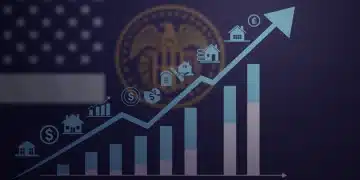Mortgage delinquency rates rise in 2025: what it means

Anúncios
Mortgage delinquency rates are increasing due to economic downturns, rising interest rates, and personal financial challenges, impacting both homeowners and lenders significantly.
Mortgage delinquency rates rise in 2025, and this trend raises important questions for homeowners. Are you prepared for the potential impacts on your finances and housing options? Let’s delve into what this means.
Anúncios
Understanding mortgage delinquency rates
Understanding mortgage delinquency rates is essential for anyone interested in the housing market. These rates indicate how many borrowers are failing to make their mortgage payments on time, which can signal underlying issues in the economy or housing market.
To grasp the significance of these rates, it’s helpful to consider the factors that contribute to their fluctuations. Several elements can drive changes in mortgage delinquency rates, so let’s explore them closely.
Anúncios
Key Factors Influencing Delinquency Rates
There are multiple reasons why mortgage delinquency rates may rise:
- Economic downturns: When the economy struggles, many lose their jobs or face reduced income, making it hard to keep up with mortgage payments.
- Interest rate changes: Increases in interest rates can lead to higher monthly payments, pushing some homeowners into delinquency.
- Housing market conditions: A slowing housing market can leave homeowners with less equity, making it harder to sell or refinance their loans.
- Personal circumstances: Life events such as divorce, illness, or unexpected expenses can affect a borrower’s ability to pay their mortgage on time.
It’s also important to consider the impacts of rising mortgage delinquency rates. Not only does it affect the individual homeowner, but it can also lead to broader implications for lenders and the overall housing market. For homeowners, falling behind on payments can result in increased stress and the risk of foreclosure.
Lenders may tighten their requirements if delinquency rates increase, making it harder for potential buyers to secure loans. This, in turn, affects the housing market by reducing demand for homes. Understanding these dynamics can help homeowners and potential buyers make informed decisions.
Factors driving the rise in delinquencies

Several factors are driving the rise in mortgage delinquency rates. Understanding these influences can help homeowners and investors prepare for potential changes in the housing market. The economy is a major player; when it shifts, so do people’s abilities to pay their mortgages.
Many borrowers face job losses or reduced income during economic downturns. This can make it tough to keep up with bills, which includes mortgage payments. As families struggle financially, they might prioritize other expenses over their mortgage, leading to higher delinquency rates.
Interest Rates and Market Conditions
Another important factor is the fluctuation in interest rates. When rates rise, monthly mortgage payments may increase significantly, putting pressure on homeowners to adjust. Higher payments can lead some to fall behind, especially if they are already in a tight financial situation.
- Unemployment rates: Higher unemployment means fewer people have stable incomes to pay their mortgages.
- Inflation: As costs for essentials rise, homeowners may struggle to balance their budgets.
- Decreased Home Values: If home prices drop, owners feel less secure about selling their homes, which can prevent them from avoiding foreclosure.
Personal circumstances also play a crucial role. Events such as divorce, medical emergencies, or unexpected expenses can strain finances. Homeowners may find themselves unable to manage their mortgage alongside these challenges. All these reasons contribute to an increased risk of delinquency.
As we analyze the landscape, it becomes clear that keeping an eye on these factors can provide insights into the future direction of mortgage delinquency rates. Paying attention to economic trends and personal financial health is vital for everyone involved in the housing market.
Impact on homeowners and lenders
The impact of rising mortgage delinquency rates is felt by both homeowners and lenders. For homeowners, falling behind on mortgage payments can lead to stress and uncertainty about their financial futures. This situation can put families at risk of foreclosure, which is a devastating outcome that can disrupt lives.
Lenders are also affected when many borrowers face delinquency. Financial institutions may incur significant losses due to unpaid loans. This creates a ripple effect throughout the housing market, as lenders become more cautious in issuing loans.
Effects on Homeowners
When homeowners experience mortgage delinquency, several consequences can arise:
- Credit Score Impact: Missing payments can severely damage a homeowner’s credit score, making it harder to secure future loans.
- Increased Stress: The constant worry of financial instability can lead to emotional distress within families.
- Risk of Foreclosure: Prolonged delinquency can result in losing their homes, which threatens overall family stability.
Understanding these effects is crucial for homeowners who might be facing difficulties. It’s important to know that they are not alone and that options exist to help manage their situations.
Effects on Lenders
Lenders must navigate their own challenges when faced with high mortgage delinquency rates. When many borrowers default, lenders react in several ways:
- Tighter Lending Practices: Lenders may raise interest rates or change loan criteria, making it harder for potential homeowners to qualify for mortgages.
- Increased Foreclosure Costs: Handling foreclosures can be costly and time-consuming for banks and other lenders.
- Market Instability: A higher rate of delinquency can lead to broader instability in the housing market, affecting overall home values.
Both homeowners and lenders face significant challenges as delinquency rates rise. Awareness of these impacts can help both parties navigate the complexities of the housing market more effectively.
Strategies for navigating upcoming challenges

As mortgage delinquency rates rise, it’s crucial for homeowners to adopt strategies that can help them navigate potential challenges. Being proactive can make a significant difference in managing financial stress and keeping their homes secure. Understanding available options is the first step toward taking control of the situation.
Homeowners facing difficulties should explore various strategies to safeguard their finances. One effective approach is to reach out to lenders for assistance. Many lenders offer programs designed to help struggling borrowers. These programs may provide options for loan modification or forbearance.
Communicate with Your Lender
Maintaining open lines of communication with lenders can lead to effective solutions:
- Ask About Options: Contact your lender to ask about any available assistance programs.
- Explain Your Situation: Clearly communicate your financial difficulties to explore tailored solutions.
- Follow Up: Stay in touch to ensure your requests are receiving the necessary attention.
In addition to communicating with lenders, homeowners should prioritize budgeting and reducing expenses. The focus should be on essential expenses while cutting back on non-essential items. Even small adjustments can lead to significant savings over time and help maintain a steady cash flow.
Seek Help from Professionals
Working with housing counselors can also be beneficial. These professionals provide valuable resources and knowledge:
- Financial Counseling: They help create a budget and offer advice on how to manage debts.
- Foreclosure Prevention: Counselors can guide you through options to avoid foreclosure.
- Education Resources: Gain insights on improving financial literacy and better managing funds.
Finally, having a strong support system, including family and friends, can significantly help homeowners during tough times. Emotional support is vital when facing financial challenges. Encouragement from loved ones can motivate action and foster resilience.
FAQ – Frequently Asked Questions about Mortgage Delinquency Rates
What are mortgage delinquency rates?
Mortgage delinquency rates indicate the percentage of borrowers who are late on their mortgage payments, which can signal potential issues in the housing market.
How can homeowners prevent mortgage delinquency?
Homeowners can prevent delinquency by budgeting wisely, communicating with lenders about their situation, and seeking professional advice when needed.
What should lenders do during rising delinquency rates?
Lenders should evaluate their lending practices, possibly tighten loan requirements, and work with borrowers to find solutions to avoid defaults.
Are there programs available to help struggling homeowners?
Yes, many lenders offer assistance programs, including loan modifications and forbearance options, to help homeowners manage their mortgage payments.





